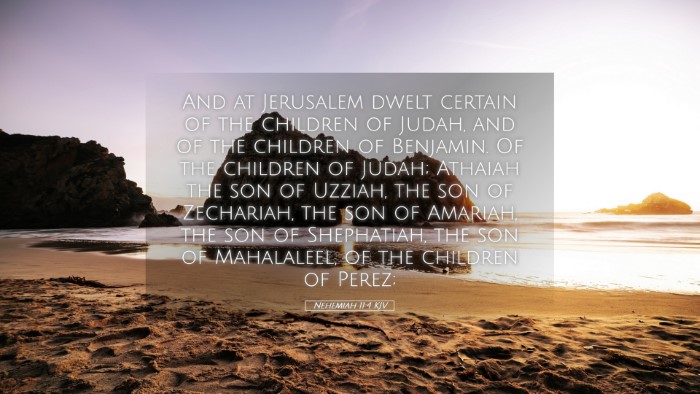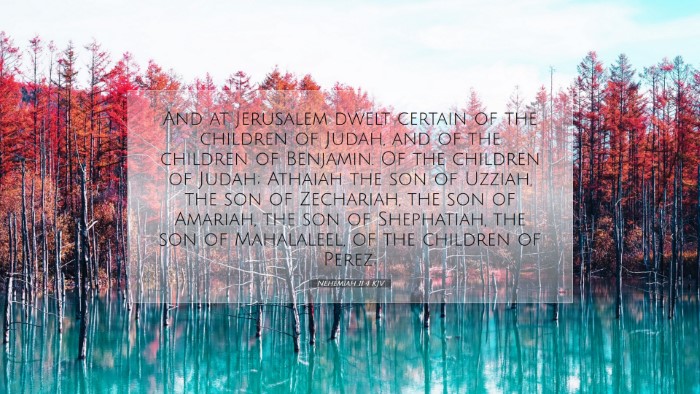Commentary on Nehemiah 11:4
Nehemiah 11:4 (KJV): "And in Jerusalem dwelt certain of the children of Judah, and of the children of Benjamin."
Context and Historical Background
Nehemiah 11 is situated within a larger narrative of the post-exilic restoration of Jerusalem. After the completion of the wall, a significant aspect of revitalizing Jerusalem was repopulating the city with its people.
Matthew Henry emphasizes that this verse marks a crucial moment in the re-establishment of Jewish life in Jerusalem, highlighting the importance of maintaining a strong community in the holy city.
The Importance of Jerusalem
The mention of Judah and Benjamin is significant as these tribes were central to the identity and heritage of the Israelites.
Albert Barnes notes that these tribes particularly represent the duality of leadership and priesthood within the Israelite community.
The sons of Judah were associated with the royal line (from which the Messiah would ultimately come), while Benjamin's territory contained important religious sites.
Community and Identity
The decision to dwell in Jerusalem was not merely a physical relocation but a profound statement of identity and commitment to God’s covenant.
Adam Clarke suggests that the act of repopulating Jerusalem reflects a dedication to restoring the worship practices that had been part of Israel's identity.
This highlights the significance of community in fulfilling God’s purposes and establishing a tangible presence within the city.
The Calling of the Exiles
The return of the exiles to Jerusalem was seen as a fulfillment of prophecy and a divine calling.
It was essential that those who returned were committed to the God of Israel.
In Matthew Henry's view, the return was also a purposeful act of obedience that served a dual purpose: restoring Jerusalem and reinstituting true worship.
The families that settled in Jerusalem essentially acted as ‘living stones’ in the sacred structure the Israelites were called to build.
Role of Faith and Sacrifice
Those who chose to live in Jerusalem faced challenges and hardships, as it was more vulnerable than the surrounding regions.
Adam Clarke reflects on the sacrifices these individuals made, emphasizing their faith in God’s promises.
Embracing the call to live in Jerusalem would have necessitated both faith and sacrifice, as many would prefer the safer, more established surroundings outside the city.
Theological Implications
The verse invites deeper theological reflection on the nature of community among God’s people.
Albert Barnes highlights that the identity of the community within Jerusalem signifies a return to God’s design for His people, centered around worship and obedience.
This creates a paradigm for modern believers and congregations, prompting reflections on their own sense of place and commitment within the Body of Christ.
Conclusion
Nehemiah 11:4 serves as a gateway into understanding not only the historical relayout of a post-exilic community but also the underlying theological imperatives.
The motivations behind the return, the importance of community stake, and the call to identity all resonate deeply through the ages.
For pastors, theologians, and students, this verse encapsulates the essence of living faithfully in alignment with God’s covenant promises and the significance of rebuilding community upon those promises.


